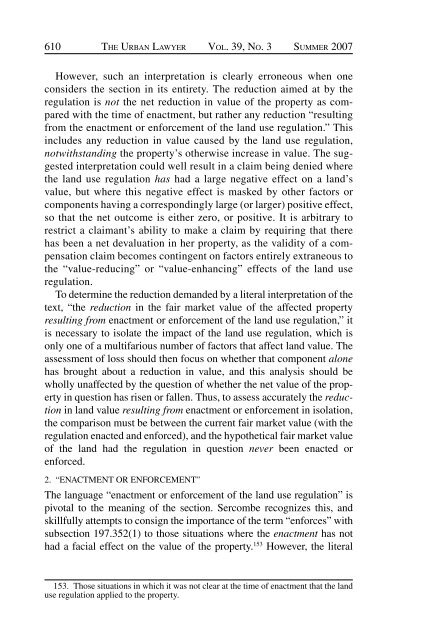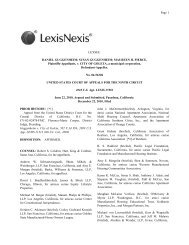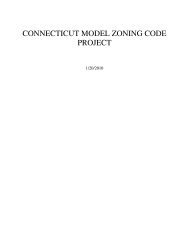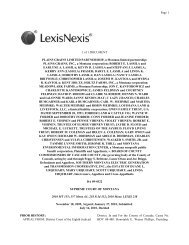Through a Glass Darkly: Measuring Loss Under ... - Land Use Law
Through a Glass Darkly: Measuring Loss Under ... - Land Use Law
Through a Glass Darkly: Measuring Loss Under ... - Land Use Law
Create successful ePaper yourself
Turn your PDF publications into a flip-book with our unique Google optimized e-Paper software.
610 THE URBAN LAWYER VOL. 39, NO. 3 SUMMER 2007<br />
However, such an interpretation is clearly erroneous when one<br />
considers the section in its entirety. The reduction aimed at by the<br />
regulation is not the net reduction in value of the property as compared<br />
with the time of enactment, but rather any reduction “resulting<br />
from the enactment or enforcement of the land use regulation.” This<br />
includes any reduction in value caused by the land use regulation,<br />
notwithstanding the property’s otherwise increase in value. The suggested<br />
interpretation could well result in a claim being denied where<br />
the land use regulation has had a large negative effect on a land’s<br />
value, but where this negative effect is masked by other factors or<br />
components having a correspondingly large (or larger) positive effect,<br />
so that the net outcome is either zero, or positive. It is arbitrary to<br />
restrict a claimant’s ability to make a claim by requiring that there<br />
has been a net devaluation in her property, as the validity of a compensation<br />
claim becomes contingent on factors entirely extraneous to<br />
the “value-reducing” or “value-enhancing” effects of the land use<br />
regulation.<br />
To determine the reduction demanded by a literal interpretation of the<br />
text, “the reduction in the fair market value of the affected property<br />
resulting from enactment or enforcement of the land use regulation,” it<br />
is necessary to isolate the impact of the land use regulation, which is<br />
only one of a multifarious number of factors that affect land value. The<br />
assessment of loss should then focus on whether that component alone<br />
has brought about a reduction in value, and this analysis should be<br />
wholly unaffected by the question of whether the net value of the property<br />
in question has risen or fallen. Thus, to assess accurately the reduction<br />
in land value resulting from enactment or enforcement in isolation,<br />
the comparison must be between the current fair market value (with the<br />
regulation enacted and enforced), and the hypothetical fair market value<br />
of the land had the regulation in question never been enacted or<br />
enforced.<br />
2. “ENACTMENT OR ENFORCEMENT”<br />
The language “enactment or enforcement of the land use regulation” is<br />
pivotal to the meaning of the section. Sercombe recognizes this, and<br />
skillfully attempts to consign the importance of the term “enforces” with<br />
subsection 197.352(1) to those situations where the enactment has not<br />
had a facial effect on the value of the property. 153 However, the literal<br />
153. Those situations in which it was not clear at the time of enactment that the land<br />
use regulation applied to the property.<br />
ABA-TUL-07-0701-Sullivan.indd 610<br />
9/18/07 10:43:45 AM







